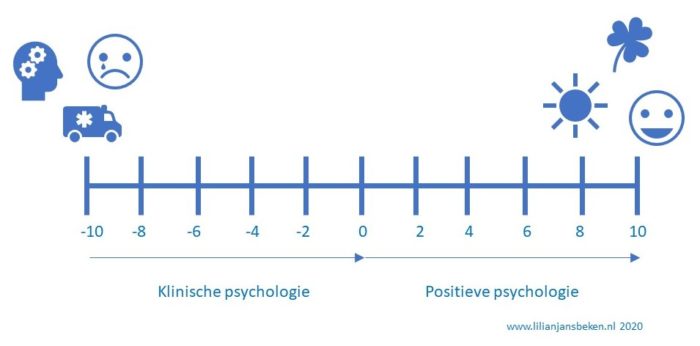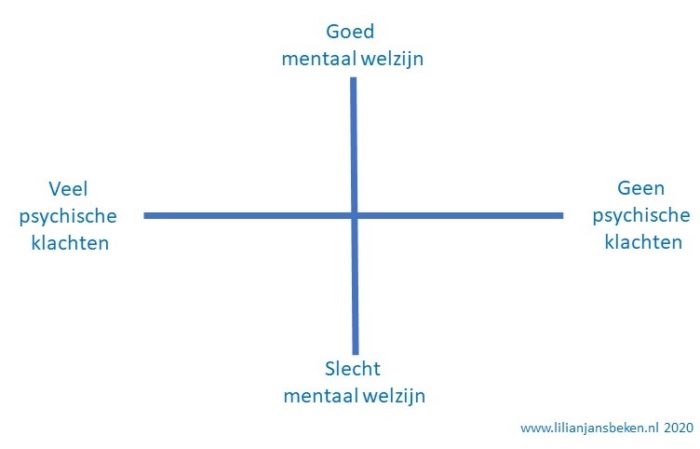Clinical psychology
Initially, mental health was presented as a horizontal axis, such as the figure below. Having psychological complaints is completely on the left with the negative numbers. The more problems with psychological complaints, the lower the number. Clinical psychology focuses on therapies and programs to reduce or eliminate psychological symptoms. If there are no more complaints, the person has a score of around zero and the work of the clinical psychologist is done. But a zero is not really good, it is at best average.

Positive psychology
Positive psychology then developed which is concerned with increasing the score from zero to ten. A ten means that there is good mental well-being. There are no psychological symptoms and the person feels happy, joyful and satisfied. To get from zero to ten, positive psychology makes use of all kinds of positive psychological exercises such as the gratitude diary, the three-good-things exercise, the-best-possible-self exercise or mindfulness training. One of the goals is to get as close to ten as possible so that if life is taking a bad turn, someone will not fall directly below zero but will be resilient enough to cope with the setback.
The reality
This way of thinking about mental health was very straightforward and it didn’t seem to fit well into reality. After all, it is possible that someone with depressive symptoms who feels connected to his family attributes himself a better quality-of-life than someone who is lonely in life. Or someone with a psychosis who looks at life optimistically may be better able to deal with the psychological symptoms than someone who is more depressed and pessimistic. Psychological complaints and mental well-being influence each other but are different things.

Two-continua model of mental health
For that reason, the American psychologist Corey Keyes cut the above axis in two and made it into a model with two axes: the two-continua model of mental health. The psychological symptoms, whether or not present, are plotted on the horizontal axis and the mental wellbeing, whether or not present, is displayed on the vertical axis. By psychological complaints we mean disorders such as depression, anxiety, psychoses, compulsive thoughts or post-traumatic stress. Mental well-being includes characteristics such as optimism, positive feelings, sense of purpose, social connectedness and gratitude. For someone with the same degree of psychological symptoms, mental well-being can be crucial for their perception of quality-of-life.

Research
Research has indeed shown that the two-continua model of mental health is well applicable in the world of everyday life. One of my research was into gratitude, mental well-being and psychological complaints over a period of thirty weeks. From this study it became clear that gratitude does not immediately reduce psychological complaints on the long run, but that gratitude is related to better mental well-being. Improved mental well-being was then associated with fewer psychological symptoms over time.
Conclusion
This insight into mental health shows that we need the care and knowledge of clinical psychology to score as well as possible on the axis of psychological complaints; the less psychological complaints the better. Positive psychology, preferably with the approach of positive psychology 2.0, has the knowledge and insights to improve mental well-being. Together they can help find a good balance on the two-continua model of mental health and thus support people in their thriving.
Sources:
– Jans-Beken, L. G. P. J. (2019). The Dialectic Dynamics Between Trait Gratitude Subjective Well-Being and Psychopathology Across 30 Weeks. Counselling Psychology Quarterly. https://doi.org/10.1080/09515070.2019.1638228
– Keyes, C. L. (2005). Mental illness and/or mental health? Investigating axioms of the complete state model of health. Journal of Consulting and Clinical Psychology, 73(3), 539–548. https://doi.org/10.1037/0022-006X.73.3.539




